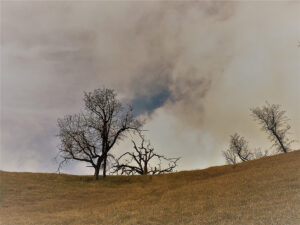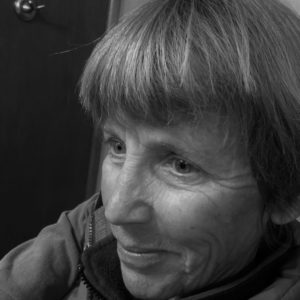 It’s the second day of March. This won’t go to print for more than a week. We all know what a week can bring. It was exactly a week ago that Ukrainians woke up to their country at war. But I am writing this now because the moment feels more important than a newspaper timeline. And because acts of aggression are timeless.
It’s the second day of March. This won’t go to print for more than a week. We all know what a week can bring. It was exactly a week ago that Ukrainians woke up to their country at war. But I am writing this now because the moment feels more important than a newspaper timeline. And because acts of aggression are timeless.
Our friend Laura Kelly writes from Bulgaria where she is teaching journalism: 26 Ukrainian students on campus. Palpable dread, distress among students and profs. Refugees coming into Bulgaria over the Romanian border. It feels close and very very real and world scary. One of my students, Viktor, I am especially close with. Just met his parents a month ago when they came from Kyiv for the screening of his senior project. I love this kid, have had him in 4 classes. Viktor tethers me to Ukraine and I am heartbroken.
This week I’ve chosen to send out an old Letter From Home. It was one of the first I ever wrote for the column, back in November of 2017. It’s a long piece, longer than you may feel you have time for or interest in. Still, I’m sending it out in its entirety as a reminder. The Cold War itself was long and full of waiting and full of a kind of wonder that I don’t mean to equate with Christmas or fireflies or the first snowfall. It was the wonder of children who struggled to understand what was happening around them, why they had to run to their lockers and wedge their small bodies inside.
By the time this goes to print there may be signs that air raid sirens and fallout shelters are not the direction in which we’re headed once again. But for the Ukrainians, the nature of the attack on their country is not just in the details, but in the larger context of unprovoked military aggression, nuclear or not. It is, after all these years—all the many years since my own childhood—“world scary” in Laura Kelly’s words. That, and heartbreaking.
THE WAR IN WHICH WE LIVED – A childhood in uncertain times
In New York City where I grew up, we were all veterans of the Cold War. Even the youngest kids, before they could read, knew what the words Fallout Shelter looked like. And the sirens that ushered us off the streets to practice taking cover, we knew what we were supposed to do. We couldn’t articulate the end of the world, or the end of our world, the end of us, so instead we fought with each other over little things—who would get to pour the milk or sit in the coveted backward-facing seat of the Rambler—in order to demonstrate our present aliveness. At school the weekly air raid drills trained us to tuck into our lockers with our coats over our heads, knees to chin. Falling glass from the windows could slice us, we were told. But who among us understood that falling glass was nothing in the scheme of nuclear things, that melted glass and melted bodies and the destruction of entire cities, these were the possibilities before us?
Odd details stick in my mind. The sight of Nikita Khrushchev on our black-and-white television, banging his shoe on the table at the UN. The velvet collar on little John John Kennedy’s coat on that cold day in November when he and the country and the world buried his father. Barbed wire glinting atop the newly erected Berlin Wall. Posters of thin, sad children, and the words Radio Free Europe. Neil Armstrong’s footprint on the moon. Fidel Castro’s beard. Khrushchev’s mole. And one unforgettable night in October, 1962, I remember standing by the window of my room in New York City and looking out at the sickly yellow night sky, and the hulks of other apartment buildings where people like me, children like me, wondered as I did what it would feel like to be hit by an atom bomb. Wondered at the thin line of diplomacy (though I did not think of that word at the time) that might keep us from being the target of Khrushchev’s nuclear missiles. Wondered why we ever thought life was a given and strong as a cable when it was so clearly only a thread that kept us tied, in belligerence and hope, to one another. I remember even the pajamas I was wearing as I stood by the window that night of the Cuban Missile Crisis. They were pale yellow with tight cuffs at the ankles and wrists.
Our summers were free of the city, free of our nascent understanding that large, vibrant metropolises draw fire in any war. We drove north to an island off the coast of Maine where the sound of foghorns and bell buoys lulled us into a forgetfulness of our urban life. I got up in the dark every morning, pulled on a sweatshirt and shorts, and went down to the dock where a little red sailing dinghy completed my transformation to a carefree kid. I was in love with the feeling of being out on the ocean at dawn, a light wind bellying the sail and my own hands and arms reacting to forces unseen and natural in order to make a small red boat move forward.
On land we gathered as roving bands of cousins, and one day, to our astonishment, we came across a phenomenon that made so little sense to us we decided to say nothing about it. It was our secret, in an era of secrets. We were growing up in a time that encouraged us towards clandestine activity. Spies were everywhere, even in our family lore. (It was rumored our two aunties had been spies in Italy in World War II.) A spy was what you wanted to be—more than a fireman or a doctor. You could be hanged or shot for being a spy. It was an intriguing throwback profession.
What we came across that day looked like a military redoubt. It was deep in the woods, a mound of earth, more than ten feet high, covered with grass and flattened on top. On top there was a flower garden with haphazard rows of geraniums. A heavy metal door at the base of the mound opened into a series of rooms. Built-in wooden shelves lined the concrete walls. The floor was concrete as well, the place echoey. Cans of soup—tomato and chicken noodle exclusively—filled the shelves, along with tins of corned beef hash and Boston brown bread. More shelf space was given to water. We had never seen canned water before and something about that made us uncomfortable. There were no other signs of life, only food and water. No beds, no chairs or tables, and noticeably no TV. We left in a hurry, shrieking, after our cousin, Roger, played upon our nerves and made growling noises.
It was Roger who brought us the news, not long after, that what we had seen in the woods was a bomb shelter. A man named Burden owned the land and on it he had constructed a shelter where his family could survive not only an old-fashioned bombing but a nuclear holocaust. Even then, those of us who were old enough for thought, wondered why a family would wish to survive alone, and wondered what kind of world they might step out into when they opened that heavy metal door. The knowledge of the purpose of this structure added to our fear of it, and unmistakably fueled our desire to visit it again. We made some discoveries: the geraniums were plastic; the canned water tasted stale; to open the metal door from the inside required all our weight and adrenalin.
After that summer I never went back to the bomb shelter, though I thought about it frequently. I thought about it when four little girls were killed in a church in Birmingham, Alabama. I thought about it when tear gas and billy clubs and rifles were brought out against peaceful demonstrators in Selma and Roxbury and Kent State. I thought about it when the Reverend Martin Luther King lay in his coffin, and weeks later Robert Kennedy lay in his coffin, and I thought about it when every cemetery in America filled up with the veterans of the war in Vietnam. I thought about what a bomb shelter can and cannot do, what it can and cannot protect, and what I came up with was this: Nothing we build can keep us from the consequences of war, because we are the consequences of war.

